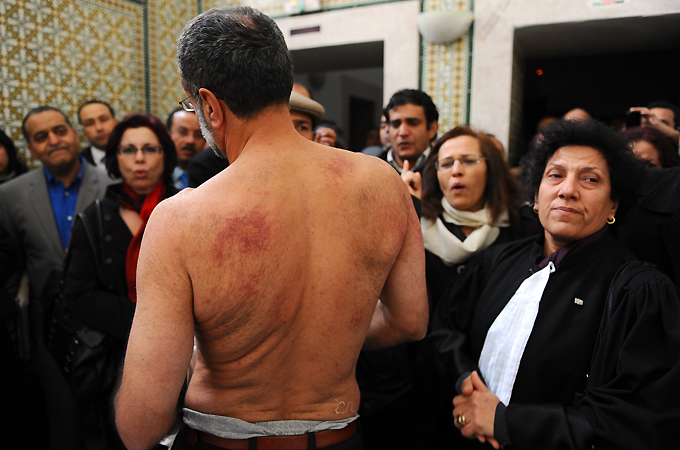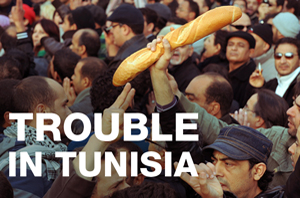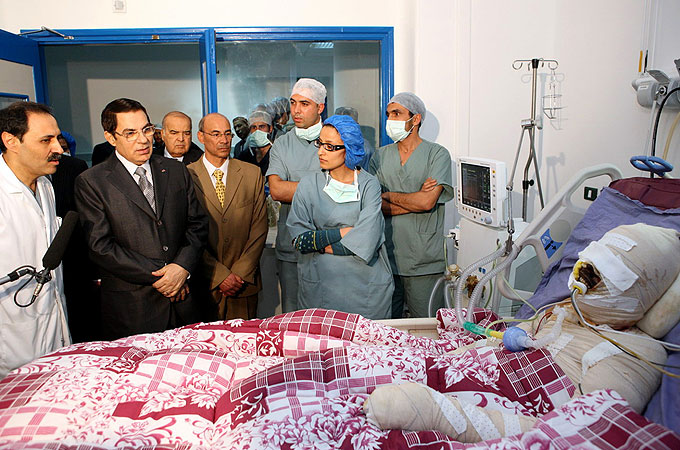Tunisian protester dies of burns
Mohamed Bouazizi, the 26-year-old unemployed man whose self-immolation sparked nationwide unrest, dies of severe burns.

 |
| Lawyers who protested in solidarity with jobless and frustrated youth allege that police tortured them [AFP] |
A 26-year-old Tunisian man who set off a wave of protests after attempting to commit suicide by setting himself on fire last month has died of third-degree burns in hospital, his relatives and human rights groups have said.
Mohamed Bouazizi died at 5:30 pm local time on Tuesday at a hospital in the town of Ben Arous, his brother Salem Bouazizi told the AFP news agency.
Bouazizi is the fourth person confirmed to have died in a wave of social unrest that entered its 20th day on Wednesday.
A funeral was held for the young man on Wednesday in his home town of Sidi Bouzid, Tunisian blogger Lina Ben Mhenni told Al Jazeera.
Bouazizi doused himself in petrol and set himself alight on December 17 in front of a government building in the town in central Tunisia, after police allegedly confiscated his fruit and vegetable stand because he lacked a permit and then abused him.
Bouazizi was an unemployed college graduate who turned to selling produce to make ends meet. His suicide attempt highlighted the rampant problem of unemployment in a nation often portrayed as a tourist haven and economic success.
 |
Within a week after Bouazizi’s act, protests had spread and two more protesters had died: 22-year-old Houcine Falhi committed suicide by electrocuting himself at a protest, while Mohamed Ammari, 18, was shot to death by police.
Chawki Belhoussine El Hadri, 44, was shot by police on December 24 and died of his wounds six days later.
Recently, lawyers and students have continued to lead demonstrations against the government throughout the country.
About 250 people who marched in the town of Thala on Monday were met by police, firing tear gas to contain them.
The crowd responded by setting fire to tyres and attacking offices of the ruling party.
Police stormed an organised at the Human and Social Sciences Department of the University 9 avril in Tunis, using batons and teargas against the students who had gathered on Wednesday, Ben Mhenni said.
Information blackout
Information from Tunisia has been scarce as the government has moved to censor Internet access.
Activists and those writing about the protests have found their email, Facebook and blog accounts hacked, Ben Mhenni told Al Jazeera.
The Tunisian Bar Association has scheduled a general strike for Thursday.
 |
| Tunisian president Zine El-Abidine Ben Ali (2nd L) visited Bouazizi in hospital on December 28 [AFP] |
Activists had tried to organise a national strike on Monday, coinciding with the day that students were set to return to school from their holidays, but it was hard to verify whether the strike had occurred.
Outside groups have also recently begun to offer support to the Tunisian protesters. On Monday, the international, decentralised hacker group called Anonymous managed to shut down a number of government websites through a “direct denial-of-service” attack.
At least 14 websites, including those for the president, prime minister, ruling party, ministry of foreign relations and stock exchange, remained inaccessible as of Wednesday afternoon, local time.
Rare demonstrations
Bouazizi’s desperate protest act has set off rare public unrest in Tunisia.
Zine El Abidine Ben Ali, who has served as the country’s president since 1987, took to state television on December 28 to denounce the protesters as “a minority of extremists” and promised the law would be applied “in all firmness” to punish them.
But Ben Ali has also taken steps to try to placate the demonstrators: He has removed three ministers and two governors from their positions and promised a $5 billion state jobs programme.
None of that appears to have pleased Tunisia’s disenchanted protesters.
Most Western governments and major media organisations have not addressed or covered the events in Tunisia.
At least one columnist, the UK Guardian’s Brian Whitaker, wrote on December 30 that the protests were the “biggest, most important and most inspiring story from the Middle East this year”.
Disputed details
Al Jazeera’s coverage has been criticised by Tunisian politicians and some journalists, while other writers and activists have praised it.
Since Ben Ali became president, Tunisia has moved away from centralised economic control, reduced tariffs, and sought loans from the World Bank.
The International Monetary Fund (IMF) estimated in September that Tunisia’s unemployment rate is 13.3 per cent, but non-governmental sources believe it rises higher in certain areas, such as Sidi Bouzid, the heart of the protests, where 44 per cent of female university graduates and 25 per cent of male graduates are reportedly unemployed.
Though the IMF has praised Tunisia’s economic performance and liberalisation, extolling its rising growth rate throughout the global economic crisis, it has noted that unemployment is also on the rise.
Part of the problem may lie with endemic corruption.
A 2008 diplomatic cable signed by Robert Godec, the US ambassador, and released by WikiLeaks in December describes both low- and high-level corruption in the country that scares away foreign and domestic investors.
“Whether it’s cash, services, land, property, or yes, even your yacht, President Ben Ali’s family is rumoured to covet it and reportedly gets what it wants,” the cable states.